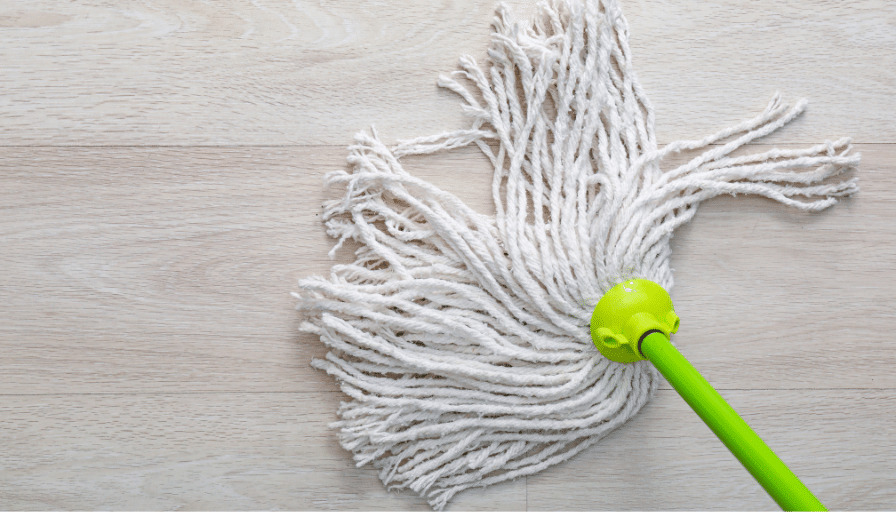Laminate flooring has become a popular choice for homeowners due to its durability, affordability, and aesthetic appeal. However, like any other type of flooring, laminate floors require regular cleaning to maintain their beauty and longevity.
In this article, we will provide a step-by-step guide on how to effectively clean laminate flooring with a mop.
To begin, it is essential to gather the right cleaning supplies, ensuring they are specifically designed for laminate floors. Preparing the laminate flooring by removing any loose debris or dirt is crucial before starting the cleaning process. Choosing the right mop that is suitable for laminate floors is equally important to prevent any damage.
Next, applying a cleaning solution specifically formulated for laminate floors will effectively remove any stubborn stains or dirt. Mopping the laminate flooring in a systematic and efficient manner will ensure thorough cleaning.
Finally, drying the floors properly and maintaining their cleanliness through regular maintenance will extend the life of the laminate flooring. By following these detailed steps, homeowners can keep their laminate floors looking pristine and beautiful for years to come.
Key Takeaways
- Gather the right cleaning supplies specifically designed for laminate floors.
- Choose a mop suitable for laminate floors to prevent damage.
- Use a cleaning solution formulated for laminate floors to remove stubborn stains or dirt.
- Properly dry the floors to maintain their cleanliness and extend their life.
Gathering the Right Cleaning Supplies
To ensure an effective and efficient cleaning process, it is essential to gather the appropriate cleaning supplies for maintaining laminate flooring with a mop. Choosing the right cleaning products is crucial to prevent damage and maintain the longevity of the flooring.
It is recommended to use a pH-neutral cleaner specifically designed for laminate floors, as harsh chemicals can strip away the protective layer and cause discoloration. Additionally, it is important to avoid common cleaning mistakes, such as using excessive water or soaking the mop, as this can lead to warping or swelling of the laminate. Instead, lightly dampen the mop and wring out any excess water before cleaning.
By following these guidelines and selecting the correct cleaning products, one can effectively clean laminate flooring with a mop while ensuring its durability and appearance are preserved.
Preparing the Laminate Flooring
Before beginning the cleaning process, it is essential to adequately prepare the surface of the laminate for optimal results. This involves taking necessary steps to remove stubborn stains and preventing any potential damage to the laminate.
Firstly, it is important to sweep or vacuum the flooring to remove any loose dirt or debris. This will prevent scratching or spreading of particles during the cleaning process.
Next, it is recommended to use a mild detergent or cleaner specifically designed for laminate flooring. Harsh chemicals or abrasive cleaners should be avoided as they can cause discoloration or damage to the laminate.
Additionally, it is crucial to wring out the mop thoroughly to prevent excessive moisture from seeping into the laminate, which can lead to warping or swelling.
By properly preparing the laminate flooring, one can ensure effective and safe cleaning without compromising the integrity of the surface.
Choosing the Right Mop for Laminate Floors
Optimal cleaning results for laminate floors can be achieved by selecting a mop that is well-suited to the specific needs of the surface. When choosing the best mop for laminate floors, it is important to avoid certain common mistakes that can potentially damage the flooring.
Firstly, it is crucial to choose a mop that is gentle and non-abrasive to prevent scratching the laminate surface. Microfiber mops are recommended as they are soft and effective at trapping dirt and dust particles.
Additionally, it is important to avoid excessive water usage when mopping laminate floors as excessive moisture can seep into the seams and cause swelling and warping. Therefore, it is advisable to opt for mops with a spray function that allows for controlled and minimal water application.
By carefully selecting the right mop and avoiding common mistakes, laminate floors can be effectively cleaned and maintained.
Applying the Cleaning Solution
Applying the appropriate cleaning solution is essential for effectively maintaining the cleanliness of laminate floors.
One effective technique is using a spray bottle to apply a vinegar solution. Vinegar is a natural and cost-effective cleaning agent that can remove dirt and grime without leaving a residue on the laminate surface.
To prepare the solution, mix equal parts of distilled white vinegar and water in a spray bottle.
Before applying the solution, it is important to sweep or vacuum the floor to remove loose dirt and debris.
Then, lightly mist the vinegar solution onto the floor, being careful not to saturate it.
Next, use a damp mop or microfiber cloth to gently clean the laminate, working in small sections at a time.
Finally, allow the floor to air dry or use a dry mop to remove any excess moisture.
By using the spray bottle technique with a vinegar solution, laminate floors can be effectively cleaned and maintained.
Mopping the Laminate Flooring
To effectively maintain the cleanliness of laminate floors, it is important to utilize a suitable method for removing dirt and grime.
Mopping the laminate flooring is a crucial step in this process. When mopping, it is essential to use a mop that is specifically designed for laminate floors to prevent any damage. These mops are usually made with microfiber or sponge materials, which are gentle on the laminate surface and effectively remove dirt and stains.
Additionally, it is important to avoid using excessive water when mopping, as laminate flooring is sensitive to moisture. Instead, dampen the mop with a minimal amount of water or a specialized laminate floor cleaner. This will prevent water from seeping into the seams and causing damage to the floor.
By following these guidelines for mop maintenance and preventing water damage, laminate floors can be effectively cleaned and maintained for a longer lifespan.
Drying and Maintaining the Clean Floors
After mopping the laminate floors, it is crucial to ensure they are thoroughly dried and properly maintained to prevent any potential damage.
To maintain the shine of laminate flooring, it is recommended to allow the floors to air dry completely. This ensures that no moisture is left behind, which may cause the laminate to warp or swell. Additionally, it is important to avoid walking on the freshly cleaned floors until they are completely dry to prevent any footprints or smudges.
To prevent scratches, it is advisable to place felt pads or furniture glides under the legs of furniture to reduce friction. Regular sweeping or vacuuming with a soft brush attachment is also necessary to remove any dirt or debris that can cause scratches.
By following these maintenance practices, the laminate floors can retain their shine and remain scratch-free for an extended period.
Frequently Asked Questions
Can I use a steam mop on laminate flooring?
Steam mops are not recommended for laminate flooring due to the high heat and moisture they produce, which can cause damage. Instead, consider using alternative cleaning methods such as dry mopping or using a damp cloth with mild cleaning products specifically designed for laminate flooring.
How often should I clean my laminate floors?
Laminate floors should be cleaned regularly to maintain their appearance and longevity. Avoid common mistakes such as using excessive water or harsh chemicals. Instead, use a damp mop, microfiber cloth, or specialized laminate floor cleaner for effective and safe maintenance.
Is it necessary to vacuum before mopping laminate flooring?
Vacuuming before mopping laminate flooring is beneficial as it removes dirt, debris, and pet hair which can scratch the surface. Alternatively, using a microfiber cloth or dry mop can help eliminate the need for vacuuming.
Can I use regular household cleaners on laminate flooring?
Using regular household cleaners on laminate flooring is not recommended as they can damage the surface. Instead, consider using alternative cleaning methods and eco-friendly cleaning solutions specifically designed for laminate flooring to ensure its longevity and appearance.
How long should I wait before walking on the floors after mopping?
The drying time for laminate floors after mopping depends on various factors such as humidity, room temperature, and the amount of water used. It is recommended to wait at least 30 minutes to 1 hour before walking on the floors to ensure they are fully dry.
Conclusion
In conclusion, cleaning laminate flooring with a mop requires the right cleaning supplies, proper preparation of the flooring, and choosing the appropriate mop.
It is important to use a cleaning solution that is specifically designed for laminate floors and to mop the floors in a gentle and controlled manner.
After mopping, it is crucial to allow the floors to dry completely to prevent any damage.
Regular maintenance is also essential to keep the laminate flooring clean and in good condition.


